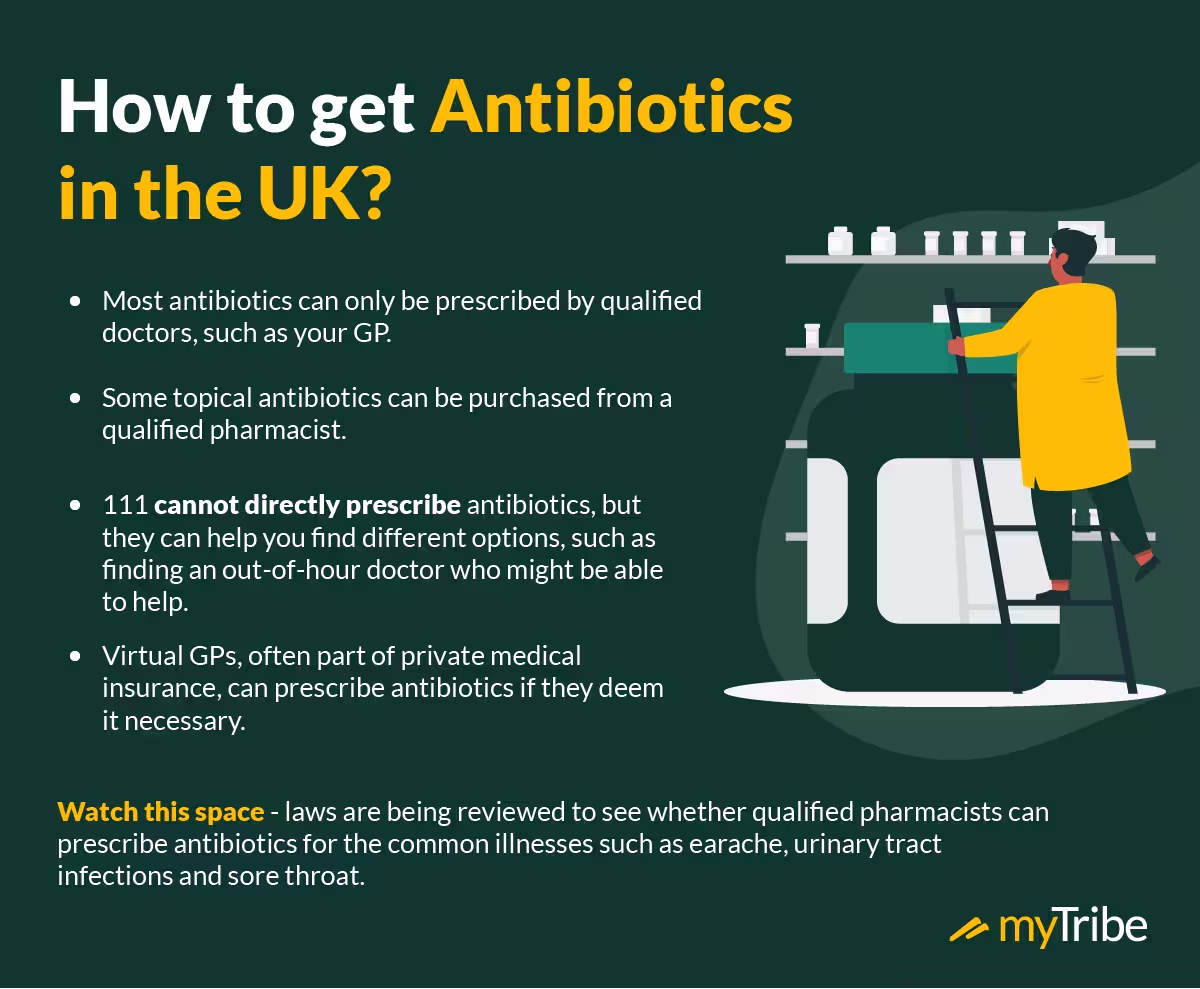Can I buy antibiotics over the counter in the UK?
Most of us have been lucky enough to grow up knowing that if we’re sick, we can rely on antibiotics to get us back on our feet. But with many patients saying they are struggling to get a GP appointment, is there an option to buy antibiotics elsewhere? We look at who can prescribe medicines and what your options are if you think you need antibiotics but cannot see a GP.


Can you get antibiotics without seeing a doctor in the UK?
Generally speaking, no. In most instances, you can only get antibiotics if they’re prescribed by a doctor.
Your doctor will need to assess your symptoms in order to give you an accurate diagnosis and prescribe the most appropriate treatment – which may or may not be antibiotics.
Can UK pharmacists give antibiotics?
Pharmacists cannot normally prescribe antibiotics. However, under the Pharmacy First scheme launched on 31 January 2024, pharmacists in England can now prescribe medicines for seven common conditions. Similar schemes already exist in Scotland, Wales, and Northern Ireland.
The only infections that pharmacists in England will be allowed to prescribe for are:
- Earache
- Urinary tract infections
- Sore throat (most will not require antibiotics but if a bacterial infection causes it, you may need prescription medicine)
- Sinusitis
- Impetigo
- Shingles
- Infected insect bites
The scheme now means that you can visit your local chemist, be assessed, and, if appropriate, buy prescription-only medication to treat the condition. You’ll also be able to access treatment if you’ve been referred to a pharmacy by NHS 111, urgent treatment centres, emergency departments or your GP practice.
In most cases, anyone will be able to access treatment under the Pharmacy First scheme, including if you’re pregnant, breastfeeding or are immunosuppressed. You don’t have to be registered with a GP practice either.
Children over the age of one are also entitled to treatment, so if you suspect your child has an ear infection, you’ll be able to take them straight to a pharmacy to be checked. One exception is for sore throats and younger children under the age of five should still be seen by a doctor.
It’s hoped that the scheme will free up around ten million GP appointments each year and give patients faster access to the treatment they need.
The programme has also been carefully planned, and pharmacists have clear guidelines to follow. Bear in mind that your pharmacist may advise you to see your GP if they can’t confirm your illness or if they think it might be something else.
If your illness isn’t one of the seven listed, your pharmacist won’t be able to prescribe you any medication unless they are trained as a Pharmacist Independent Prescriber (PIP. They must also meet certain conditions, for example, they must have relevant experience.
To qualify as a PIP, they must take an accredited course. Even under these circumstances, a PIP can only prescribe certain medicines.
A pharmacist may also be able to offer certain medicines under the ‘patient group direction’ scheme (PGD). This means pharmacists can provide treatment to a specific group of people, and individuals looking for help won’t need to be specifically assessed. For example, a pre-defined group could be people suffering from a urinary tract infection or people with eczema.
Can you buy any antibiotics over the counter?
A few antibiotics are available over the counter, but these will usually be milder versions of what your GP would prescribe. Whether you’re actually able to buy these treatments will also depend on the strength of the product you’re buying, what you intend to use it for and your own overall health. In many cases, these types of antibiotics are limited to topical treatments – for example, creams for certain skin conditions such as eczema and psoriasis.
Can you buy antibiotics privately in the UK?
If you have private health insurance and are able to see a GP who prescribes medication, you can take your prescription to any pharmacy as normal. Depending on your circumstances and what the medicine is, you may have to pay prescription charges.
Otherwise, you can’t buy antibiotics from a private seller – they must be prescribed by a doctor and dispensed by a pharmacy.

Can UK pharmacists give antibiotics?
Pharmacists cannot normally prescribe antibiotics. Some pharmacists can but they must be trained as a Pharmacist Independent Prescriber (PIP). They must also meet certain conditions, for example, they must have relevant experience.
To qualify as a PIP, they must take an accredited course. Even under these circumstances, a PIP can only prescribe certain medicines.
A pharmacist may also be able to offer certain medicines under the ‘patient group direction’ scheme (PGD). This means pharmacists can provide treatment to a specific group of people, and individuals looking for help won’t need to be specifically assessed. For example, a pre-defined group could be people suffering from a urinary tract infection or people with eczema.
Is the law changing so pharmacists can prescribe antibiotics?
Plans are currently underway for pharmacists in England to prescribe antibiotics for seven common conditions.
If the plan is rolled out, it will mean any pharmacist could provide prescription medicines without patients needing to see a doctor. The only infections that pharmacists will be allowed to prescribe for will be:
- Earache
- Urinary tract infections
- Sore throat (most will not require antibiotics but if it’s caused by a bacterial infection, you may need prescription medicine)
- Sinusitis
- Impetigo
- Shingles
- Infected insect bites
Can I get amoxicillin over the counter in the UK?
Amoxicillin is an antibiotic used to treat bacterial infections, for instance, pneumonia. It’s a type of penicillin and can only be bought with a prescription.
Can NHS 111 prescribe antibiotics?
No, the NHS 111 service cannot prescribe antibiotics for a new illness or infection. However, if you’ve run out of medication you currently take, you can ask for a limited supply of that medicine.
To be granted an emergency supply, the medicine you’re asking for must be one you’re taking regularly (for example, you have a repeat prescription for it).
If you need a new prescription, NHS 111 advisors can arrange an out-of-hours appointment with a doctor, if you cannot see your regular GP.
NHS 111 can also refer you to your nearest pharmacy, if they suspect you’re suffering from one of the seven conditions listed under the new Pharmacy First scheme (earache, urinary tract infections, sore throat, sinusitis, impetigo, shingles, infected insect bites). If you are, then you’ll be able to buy prescription medicine from your pharmacist if they consider it appropriate.
What should I do if I need a prescription for antibiotics?
If you think you need antibiotics, your first call should be to your GP practice. Most practices set aside a few emergency appointments so explain that you feel your case is urgent and that it’s important you see or at least speak to a doctor.
If you cannot get an appointment with a GP, find a pharmacist and speak to them. Pharmacists are trained professionals who study for at least four years to earn their master’s degree in pharmacy (MPharm). They must also complete one year’s worth of community pharmacy training before registering with the General Pharmaceutical Council. With that in mind, your local pharmacist is a valuable resource and should be able to offer practical advice about what sort of treatments are likely to work. If they feel you do need to see a GP, they will let you know (if you contact your GP practice again, you can tell them you’ve seen a pharmacist, and this is what was advised).
Alternatively, you can call NHS 111 and explain your symptoms. They may be able to offer advice or arrange an out-of-hours appointment with a doctor.
Why are most antibiotics prescription only in the UK?
Antibiotics kill bacteria so you only need them if you have a bacterial infection. Viral infections such as colds, flu and most coughs, cannot be cured with antibiotics so they won’t be prescribed. In many cases, doctors also won’t prescribe antibiotics for chest infections (such as bronchitis) either.
One of the main reasons antibiotics are so strictly controlled is because of antibiotic resistance which has increased over time.
What is antibiotic resistance and why is it a problem?
This is when antibiotics become less effective. Resistance happens naturally over time as bacteria find ways to evolve and adapt to drugs. However, it’s happening faster because antibiotics are being overused and in some instances, misused.
It’s a big problem because it potentially means some antibiotics that we rely on will no longer work. Illnesses that we would normally quickly cure will have the potential to be life-threatening, as they were in the past.
According to the World Health Organization (WHO), ‘antibiotic resistance is one of the biggest threats to global health, food security, and development today’.
How should antibiotics be used?
You should only take antibiotics that a doctor has prescribed specifically for you. If you’ve got prescription drugs, you shouldn’t share them with anyone else, even if you think you’re suffering from the same condition and share similar symptoms.
GPs prescribe medicines based on their assessment of your condition and your own medical history. What works for you might not be effective for someone else, especially if either of you is taking other medication.
In some cases, sharing prescription medicines can even be life-threatening if it contains something that triggers an allergic reaction.
It’s also important to follow any instructions you’re given about how to take the medication. For example, stick to the dosage given and take note of whether it should be taken before, after or with food.
Antibiotics should also come with an information leaflet which should tell you what to do if you miss a dose or accidentally take too much.
Usually, missing one dose or taking an extra dose shouldn’t do you any long-term harm. Advice from the NHS is to go back to the correct dosage. If you have any concerns about what your doctor has prescribed, call your practice as soon as you can.
What should I do with old prescription medicines?
If you find any old prescription medicines, you should take them to a pharmacy to be disposed of properly. General advice is that you shouldn’t put them in the bin or flush them down the toilet where they can contaminate soil or water. A build-up of antibiotics in the environment can also impact wildlife and their habitat.
Can private health insurance help me get a prescription quicker?
Most private health insurance policies include access to a GP 24/7. This can help you get a diagnosis quicker along with a prescription, if you need one.
Remember that the rules for prescribing will be the same whether you have private health insurance or not. So, while GP access is more likely to be simpler and quicker with a private health insurance package, it doesn’t give you greater access to antibiotics.
While it might feel impossible to get a GP appointment in some areas, figures from the Nuffield Trust, actually show that across England, 44% of patients are able to get an appointment the same day they call their surgery. A quarter of patients can get an appointment between one and seven days of booking. When researchers questioned patients who did not get an appointment, only 11% said it was because they couldn’t get one as quickly as they wanted.
Fundamentally, the greatest benefit of private health insurance is convenience, helping you access faster diagnosis and suitable treatment.
PMI policies can also include mental health and wellbeing support, as well as cancer care and therapies such as physiotherapy and chiropractic treatment. Another advantage is that you can choose your level of cover, so if you only want the essentials (like GP access) then a basic policy might be all you need.
If you want to find out more about how private health insurance works or to understand how you might benefit from a policy, let us know. We can put you in touch with a regulated broker who can give you expert and tailored advice.
What our readers say
We are rated Excellent on Google from 150+ reviews. Our reviews relate to the service provided by both myTribe and its partners.
Disclaimer: This information is general and what is best for you will depend on your personal circumstances. Please speak with a financial adviser or do your own research before making a decision.







